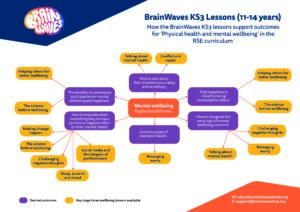
Supporting ‘mental wellbeing’ at KS3:
Statutory requirements and the BrainWaves lessons
Promoting mental wellbeing in schools is a statutory responsibility, as outlined in the DfE guidance on Relationships Education, Relationships and Sex Education (RSE), and Health Education, which establishes mental wellbeing as central to supporting pupils’ health, happiness, and academic success.
For secondary schools, this presents both an opportunity and a challenge. Teachers must ensure that their delivery not only meets statutory requirements but also equips students with the practical skills and emotional literacy needed to manage the complexities of adolescence.
The BrainWaves KS3 programme provides a free, comprehensive and structured approach that supports schools in fulfilling the DfE’s mental wellbeing curriculum. Designed for students aged 11–14, the BrainWaves lessons are grounded in positive psychology, cognitive behavioural theory, and adolescent brain development. The curriculum offers practical strategies for building resilience, promoting positive mental health, and helping students develop self-awareness, emotional regulation, and empathy — all central pillars of the statutory framework.
Understanding the statutory requirements
According to the DfE guidance, pupils should know:
- how to talk about their emotions accurately and sensitively, using appropriate vocabulary
- that happiness is linked to being connected to others
- how to recognise the early signs of mental wellbeing concerns
- common types of mental ill health (e.g. anxiety and depression)
- how to critically evaluate when something they do or are involved in has a positive or negative effect on their own or others’ mental health
- the benefits and importance of physical exercise, time outdoors, community participation and voluntary and service-based activities on mental wellbeing and happiness.
These themes are not intended to be delivered in isolation, but embedded within a broader curriculum that supports personal development and emotional wellbeing. BrainWaves provides an ideal vehicle to meet these goals through its carefully designed sequence of lessons.
How BrainWaves aligns with statutory content
The BrainWaves KS3 programme currently comprises a series of 12 FREE lessons (with more to come in late 2025!), each tackling a specific aspect of mental wellbeing. Please click to download a copy of the map below:
1. Understanding and managing emotions
Lessons such as “Talking about Mental Health” and “Challenging Negative Thoughts” support students in developing emotional literacy — a critical first step in promoting wellbeing. These lessons encourage pupils to recognise their own emotional states, understand the cognitive distortions that can drive negative thinking, and practise techniques like positive self-talk and self-compassion.
These sessions align closely with the DfE requirement for pupils to be able to “talk about their emotions accurately and sensitively, using appropriate vocabulary.”
2. Recognising mental wellbeing concerns
The “Managing Worry” lesson equips students with the knowledge to distinguish between everyday worries and more serious mental health concerns. It introduces strategies such as the worry tree, problem solving, and breathing techniques, helping students become more self-aware and capable of intervening early when difficulties arise.
This directly addresses the statutory requirement for pupils to know how to “recognise the early signs of mental wellbeing concerns” and “how to manage common types of mental ill-health such as anxiety”.
3. Building purpose and connection
The lessons on “Helping Others for Better Wellbeing” and “The Science Behind Wellbeing” both highlight to young people the importance of purpose, community, and positive emotion in promoting happiness and resilience. Students explore how volunteering, acts of kindness, and gratitude practices can enhance their own wellbeing.
These sessions address the DfE requirement to show “the benefits and importance of physical, mental and emotional wellbeing and happiness through community participation and voluntary activity.”
4. Promoting resilience and a growth mindset
“Turning Failure into Success” and “Making Change Happen” tackle key themes such as grit, resilience, goal setting, and dealing with setbacks. These concepts are central to the DfE’s guidance, which emphasises helping pupils “build the confidence to persevere” and develop “resilience and character that we know are fundamental to being happy, successful and productive members of society”.
Incorporating techniques like SMART goal-setting and reframing failure as a learning opportunity, these lessons provide evidence-informed approaches to building personal strength and self-efficacy.
5. Supporting sleep and healthy habits
Modern adolescents are increasingly affected by disrupted sleep patterns, often influenced by screen use and digital behaviours. The “Sleep, Screens and Mood” lesson helps students understand the critical link between sleep and mental wellbeing, including the physiological effects of artificial light and the importance of sleep routines.
This lesson supports the requirement for pupils to understand “the importance of sufficient good quality sleep for good health and how a lack of sleep can affect weight, mood and ability to learn.”
6. Social media awareness and digital literacy
“Social Media and the Dangers of Perfection” offers a critical lens on the curated nature of social media and its impact on body image, self-worth, and mental health. Students are taught to recognise unrealistic portrayals online, control their social media feeds, and reflect on their digital habits.
This aligns with DfE guidance requiring schools to teach students about “the impact of unhealthy or obsessive comparison with others online” and how it can affect mental health.
7. Developing positive relationships and conflict resolution
The “Conflict and Repair” lesson explores strategies for navigating interpersonal challenges and repairing damaged relationships. Students learn about assertiveness, empathy, forgiveness, and effective communication — all skills that not only support mental wellbeing but contribute to healthy relationships.
This supports the DfE’s emphasis on equipping pupils with tools to manage “conflict, reconciliation and ending relationships” as well as developing empathy and understanding.
Additional benefits for schools
Beyond curriculum alignment, BrainWaves offers several practical benefits for schools:
- Evidence-based: The curriculum draws on robust psychological research, including cognitive behavioural theory, positive psychology, and neuroscience.
- Ready-to-use resources: All lessons are fully planned, with detailed overviews, teaching materials, and extension activities. Concise, one-page Research Guides also show the evidence and research behind each strategy taught in the lessons.
- Age appropriate: Lessons are designed specifically for the 11–14 age group, taking into account cognitive, emotional and social development during adolescence.
- Bonus lessons! Two additional lessons “Understanding my strengths” and “My changing brain” provide important content for young people on how hormonal changes impact their brain and ability to self-regulate emotionally, and how they can identify and use their strengths for better wellbeing. Both these lessons support young people with positive self-identity and self-awareness, character development, and confidence, which the DfE guidance recognises as essential components of promoting good mental health and personal resilience.
- PSHE Association links: As well as links to the statutory RSE guidance, each lesson is mapped to the PSHE Association Programme of Study, making integration into existing schemes of work straightforward.
Conclusion: A comprehensive solution for ‘mental wellbeing’ education
In an educational landscape where schools are increasingly held accountable for student wellbeing, BrainWaves provides a powerful, practical solution. It enables teachers to deliver the DfE’s statutory content with confidence, while also promoting meaningful engagement, emotional growth and resilience among students. For schools seeking to align their KS3 provision with national expectations — while genuinely making a difference to young people’s wellbeing — BrainWaves offers an invaluable starting point
About the author

Tracey Riseborough is Content Manager at BrainWaves, responsible for commissioning the BrainWaves curriculum and educational resources. As part of this work, she manages the termly evaluation of the lessons by BrainWaves Research Schools, where both students and teachers provide feedback on the quality and effectiveness of the lessons. If you’d like to find out more about how you can take part in this research, please contact support@brainwaveshub.org.

